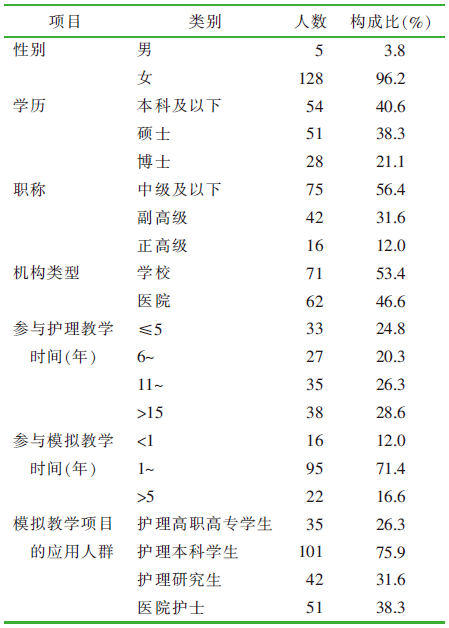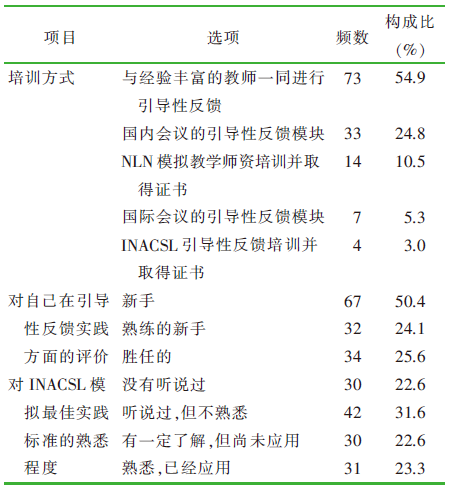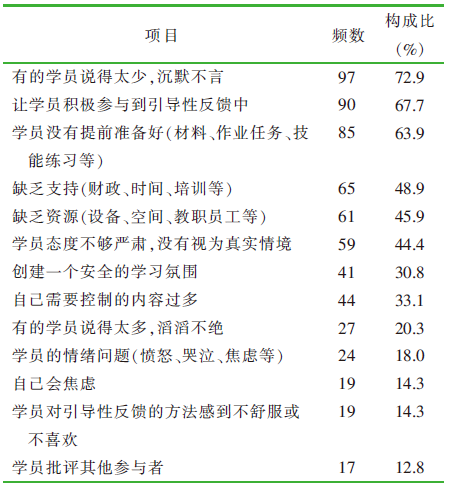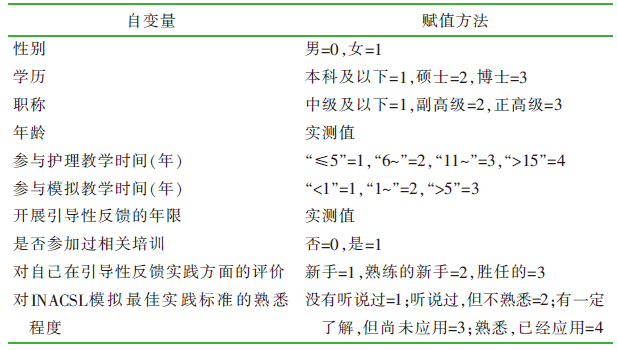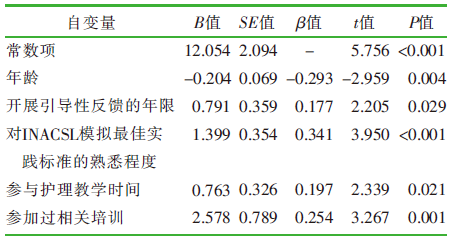| [1] |
Hayden JK, Smiley RA, Alexander M, et al. The NCSBN national simulation study:a longitudinal,randomized,controlled study replacing clinical hours with simulation in prelicensure nursing education[J]. J Nurs Regul, 2014, 5(2):S3-S40.
|
| [2] |
王艳玲, 孙柳, 吴瑛. 情景教学在我国护理教育中的应用现状与思考[J]. 中国护理管理, 2014, 14(4):354-357.
|
|
Wang YL, Sun L, Wu Y. Current situation and reflection of simulation teaching in nursing education in China[J]. Chin Nurs Manag, 2014, 14(4):354-357.
|
| [3] |
Jeffries PR. The NLN Jeffries simulation theory[M]. New York:National League for Nursing, 2015, 40.
|
| [4] |
INACSL Standards Committee. INACSL standards of best practice:simulationSM debriefing[J]. Clin Simul Nurs, 2016, 12(S):S21-S25.
doi: 10.1016/j.ecns.2016.09.008
|
| [5] |
Waznonis AR. Simulation debriefing practices in traditional baccalaureate nursing programs:national survey results[J]. Clin Simul Nurs, 2015, 11(2):110-119.
doi: 10.1016/j.ecns.2014.10.002
|
| [6] |
Fey MK, Jenkins LS. Debriefing practices in nursing education programs:results from a national study[J]. Nurs Educ Perspect, 2015, 36(6):361-366.
doi: 10.5480/14-1520
|
| [7] |
Krogh K, Bearman M, Nestel D. “Thinking on your feet”-a qualitative study of debriefing practice[J]. Adv Simul(Lond), 2016
|
|
1:12.
|
| [8] |
Kim M, Kim S. Debriefing practices in simulation-based nursing education in South Korea[J]. Clin Simul Nurs, 2017, 13(5):201-209.
doi: 10.1016/j.ecns.2017.01.008
|
| [9] |
徐丽华, 金瑞华, 王金玄, 等. 护理模拟引导者资格认证研究进展[J]. 护理研究, 2020, 34(20):3656-3660.
|
|
Xu LH, Jin RH, Wang JX, et al. Research progress on nursing simulation facilitator certification[J]. Chin Nurs Res, 2020, 34(20):3656-3660.
|
| [10] |
罗先武, 商丽, 喻惠丹. 标准化引导性反馈在高仿真模拟教学中的应用[J]. 中华护理教育, 2020, 17(2):113-116.
|
|
Luo XW, Shang L, Yu HD. The application of a standardized debriefing in high fidelity simulation teaching[J]. Chin J Nurs Educ, 2020, 17(2):113-116.
|
| [11] |
陆敏敏, 王君俏, 陈利群, 等. 反思模式在高仿真模拟教学引导性反馈中的应用效果[J]. 护理研究, 2017, 31(3):351-353.
|
|
Lu MM, Wang JQ, Chen LQ, et al. Application effect of reflective model in guided feedback of high simulation teaching[J]. Chin Nurs Res, 2017, 31(3):351-353.
|
| [12] |
王璟, 王自盼, 岳树锦, 等. 我国高仿真情景模拟护理课程教学设计存在的问题及对策[J]. 护理学报, 2018, 25(22):11-15.
|
|
Wang J, Wang ZP, Yue SJ, et al. Problems in teaching design of nursing courses with high-fidelity simulation scenario and its countermeasures[J]. J Nurs(China), 2018, 25(22):11-15.
|
| [13] |
Brett-Fleegler M, Rudolph J, Eppich W, et al. Debriefing assessment for simulation in healthcare:development and psychometric properties[J]. Simul Healthc, 2012, 7(5):288-294.
doi: 10.1097/SIH.0b013e3182620228
pmid: 22902606
|
| [14] |
Gross Forneris S, Fey MK. Critical conversations:the NLN guide for teaching thinking[J]. Nurs Educ Perspect, 2016, 37(5):248-249.
pmid: 27740554
|
| [15] |
李依霖, 康晓凤, 陈京立. 情景模拟教学的最佳实践标准[J]. 中国高等医学教育, 2017(12):28-29.
|
|
Li YL, Kang XF, Chen JL. Best practice standards for scenario simulation[J]. China High Med Educ, 2017(12):28-29.
|
| [16] |
刘敦, 姜小鹰, 宋继红. 情境模拟教学在普外科护理综合实验中的应用与效果评价[J]. 中华护理教育, 2015, 12(1):34-37.
|
|
Liu D, Jiang XY, Song JH. Effects of scenario-based simulation in the comprehensive experiment teaching of general surgical nursing[J]. Chin J Nurs Educ, 2015, 12(1):34-37.
|
| [17] |
Roh YS, Jang KI. Survey of factors influencing learner engagement with simulation debriefing among nursing students[J]. Nurs Health Sci, 2017, 19(4):485-491.
doi: 10.1111/nhs.2017.19.issue-4
|
| [18] |
Zigmont JJ, Kappus LJ, Sudikoff SN. The 3D model of debriefing:defusing,discovering,and deepening[J]. Semin Perinatol, 2011, 35(2):52-58.
doi: 10.1053/j.semperi.2011.01.003
pmid: 21440811
|
| [19] |
Decker S, Fey M, Sideras S, et al. Standards of best practice:simulation standard VI:the debriefing process[J]. Clin Simul Nurs, 2013, 9(6):S26-S29.
doi: 10.1016/j.ecns.2013.04.008
|
| [20] |
Rudolph JW, Raemer DB, Simon R. Establishing a safe container for learning in simulation:the role of the presimulation briefing[J]. Simul Healthc, 2014, 9(6):339-349.
doi: 10.1097/SIH.0000000000000047
pmid: 25188485
|
| [21] |
Page-Cutrara K. Use of prebriefing in nursing simulation:a literature review[J]. J Nurs Educ, 2014, 53(3):136-141.
doi: 10.3928/01484834-20140211-07
pmid: 24512336
|
| [22] |
Sawyer T, Eppich W, Brett-Fleegler M, et al. More than one way to debrief:a critical review of healthcare simulation debriefing methods[J]. Simul Healthc, 2016, 11(3):209-217.
doi: 10.1097/SIH.0000000000000148
|
| [23] |
Dreifuerst KT. Getting started with debriefing for meaningful learning[J]. Clin Simul Nurs, 2015, 11(5):268-275.
doi: 10.1016/j.ecns.2015.01.005
|
| [24] |
Cheng A Rodgers DL van der Jagt É, et al. Evolution of the Pediatric Advanced Life Support course:enhanced learning with a new debriefing tool and web-based module for pediatric advanced life support instructors[J]. Pediatr Crit Care Med, 2012, 13(5):589-595.
doi: 10.1097/PCC.0b013e3182417709
|
| [25] |
杨冰香, 黄润, 徐爱京, 等. 模拟教学引导性反馈的标准和策略[J]. 中华护理教育, 2020, 17(1):18-23.
|
|
Yang BX, Huang R, Xu AJ, et al. Standards and strategies of debriefing in simulation[J]. Chin J Nurs Educ, 2020, 17(1):18-23.
|
| [26] |
刘茜. 护理模拟教学中应用引导性反馈的研究进展[J]. 护理学杂志, 2015, 30(1):96-98.
|
|
Liu Q. Research advances of directed debriefing in simulation-based nursing teaching[J]. J Nurs Sci, 2015, 30(1):96-98.
|
| [27] |
Arafeh JM, Hansen SS, Nichols A. Debriefing in simulated-based learning:facilitating a reflective discussion[J]. J Perinat Neonatal Nurs, 2010, 24(4):302-309.
doi: 10.1097/JPN.0b013e3181f6b5ec
pmid: 21045608
|
| [28] |
Dreifuerst KT. The essentials of debriefing in simulation learning:a concept analysis[J]. Nurs Educ Perspect, 2009, 30(2):109-114.
pmid: 19476076
|
| [29] |
Oriot D, Alinier G. Pocket book for simulation debriefing in healthcare[M]. Cham: Springer International Publishing, 2018.
|
| [30] |
Arora S, Ahmed M, Paige J, et al. Objective structured assessment of debriefing:bringing science to the art of debriefing in surgery[J]. Ann Surg, 2012, 256(6):982-988.
doi: 10.1097/SLA.0b013e3182610c91
|


